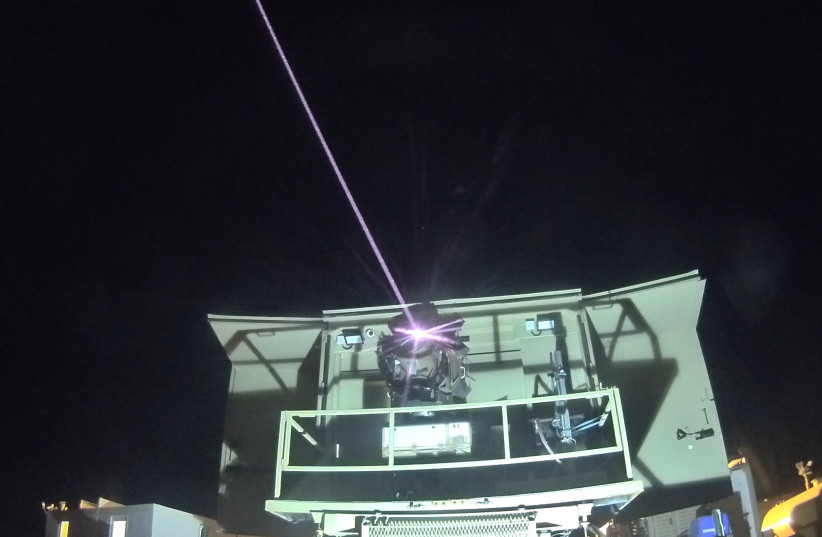It’s not every day that the president of the United States visits Israel. And while the visit might only last less than an hour for the defense establishment, they plan to use every moment of it to push their top priorities.
Here is a list of the top concerns facing Israel’s Defense Ministry and IDF that will be brought up:
1. Missile Defense (Iron Beam, MEAD)
During Joe Biden’s visit, Israel will showcase its new Iron Beam laser defense system in hopes of acquiring additional funding for the groundbreaking system. Officials are also expected to push the US to approve the sale of the system to regional countries, including the United Arab Emirates and Saudi Arabia.
Unlike other systems like the combat-proven Iron Dome and Arrow, the Iron Beam is not yet operational and is not expected to be for at least the next three years. The ground-based high-powered laser is in its advanced stages, and will be used alongside the Iron Dome to intercept aerial threats such as rockets and drones. It will also be able to handle rocket barrages.
The Middle East Air Defense “alliance” will also be a hot topic during Biden’s visit. Defense Minister Benny Gantz said that he plans to update the president on the work being done with partners throughout the region against Iran. Gantz has said that the program is already operative, and has already enabled the successful interception of Iranian attempts to attack Israel and other countries. While it is unclear which states in the region have joined, it is believed that Biden will speak with Saudi Arabia’s Crown Prince Mohammed bin Salman on it.

<br>2. Iran and its proxies
Israel considers Iran’s nuclear program to be the No. 1 concern. Although Iran has consistently denied seeking to build a nuclear bomb, tensions have risen as the West seeks to sign a nuclear deal with Tehran. The Islamic Republic also continues to develop ballistic missiles capable of carrying nuclear warheads that would take less than 15 minutes to reach Israel. Iran has several rockets that could reach Israeli territory.
The IDF has admitted that Iran’s conventional missile threat is a major worry for Israel, which despite its multi-layered air defenses, may not be able to contend with intensive missile barrages fired by Iran and its proxy groups like Hezbollah in Lebanon or Shi’ite militias in Iraq.
In addition to its nuclear and ballistic missile programs, Tehran continues with hostile activity around the Middle East, including launching drones toward Israel and other targets across the region. Iran’s Revolutionary Guard Corps also continues to plan attacks against Israelis across the world, most recently in Turkey.
Gantz has said that Israel is trying to influence the Americans behind closed doors regarding the nuclear deal that is being negotiated in Vienna. Israel is also preparing militarily for the possibility that a bad deal or no deal is signed.
3. New air platforms
Israel is concerned with the consistent delays in acquiring KC-46 tankers, which will replace Israel’s Ram (Boeing 707) tanker aircraft that are required for long-range missions and nearing the age of 60. The US State Department approved the possible sale of up to eight KC-46 tanker aircraft and related equipment to Israel for an estimated cost of $2.4 billion, marking the first time that Washington has allowed Jerusalem to buy new tankers.
Israel was set to receive two of the Boeing-made planes by late next year, but delays are pushing the date further and further back. With a range of 11,830 km and the capacity to unload 207,000 pounds of fuel, they would be a central platform for any long-range operation for the IAF.
The IAF is also waiting for the new CH-53K heavy-lift helicopter that will replace the aging Yasur fleet that has been in service since 1969. Israel announced last year that it would purchase one squadron of CH-53K to replace its fleet of Yasur helicopters at Tel Nof Air Base. They are expected to arrive by 2026.
<br>4. New Memorandum of Understanding (MOU)
Israeli officials will likely push to start the discussion of a new Memorandum of Understanding (MOU), which would allow Israel to have a framework and the freedom to decide and finance future procurement plans. A new MOU signed under Biden would provide Israel with the ability to obtain deferred payments and low interests on future major platform purchases. The agreement with Washington could also secure the ability to front-load platforms, giving the IAF the fighter jets, helicopters and transport planes now with the ability to pay later.
The replenishing and upgrading of the prepositioned precision-guided munition stockpiles that the US keeps in Israel would also save time for Jerusalem by having immediate access to them in the case of a full-scale war with the north or with Iran.
The last MOU signed between Jerusalem and Washington in 2016 under president Barack Obama gave Israel a landmark $38 billion in military aid over a decade. With talk of the West signing a new nuclear deal with Iran, Israel could even demand more from Biden in order to retain its qualitative military edge.
